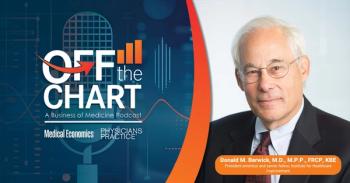
Physicians Most Vulnerable in Healthcare Cost Blame Game
When it comes to blame, physicians have gotten a pass until now.
Nothing gets the public’s attention like something that reduces their take-home pay, and when employers, healthcare providers, and state then federal government costs get hit, too, someone is going to take the fall. The blame game is in full swing, and physicians are the most vulnerable.
Fueled by the rising cost of treatment, premiums, and deductibles associated with both public and private healthcare insurance, much of it founded in legislative mandates that provide the benefits up front and pay for them later and outdated laws, real problems are looming on the horizon like an angry storm.
Think this is pot stirring hyperbole? Consider this: For the average wage earner, healthcare insurance premium increases are not only eating up raises entirely, they are taking historically larger and increasingly painful bites out of take-home pay - enough to have risen to the third largest expense after taxes and mortgage. Add rapidly increasing deductibles and household budgets for average families are in shambles with the first outpatient procedure or diagnostic.
Employers, who foot about three-quarters of the costs, are struggling too. So are federal, state, and municipal budgets.
With healthcare costs and legislation in the headlines, awareness is way up across the board.
When it comes to blame, and that is the stage in which we find ourselves today, physicians have gotten a pass until now. The reason is simple: Products and services don’t get sold unless doctors order them. But when push comes to shove, physicians are vulnerable for precisely the same reason.
For an example of where things have been, on the heels of the Express Scripts 2012 Q3 Drug Trend Quarterly report showing brand name prescriptions far outpacing the 2 percent inflation in the larger economy, Express Scripts CMO Steve Miller, MD, said in a media release, "The trend emphasizes the nation's continued need for the tools we employ to help patients make better decisions, including generic use when appropriate." Patients, not doctors … for now.
Healthcare provider associations, pharmaceutical companies, insurers, consumer organizations, and, the granddaddy of them all, the federal government, are blaming each other with increasing intensity. Higher intensity leads to higher visibility, and that intensifies the pressure to find the ultimate scapegoat.
That’s when someone inevitably says: “Doctors have the prescription pads. They decide what’s best for their patients. We just provide the options.”
And, that’s what happened this past Sunday, December 2, 2012, on CBS’ “60 Minutes.” Doctors alleged that administrators at Health Management Associates, a for-profit company that owns or operates 70 hospitals in 15 states, set quotas for admissions through their emergency rooms. Juicier still, HMA disclosed in Security and Exchange filings that it is under investigation for reasons including “the necessity of emergency room tests and patient admissions.”
HMA’s response to the Tampa Bay Times through Adam Levine, an HMA senior vice president and Florida Group president, included statements that patients’ physicians, not hospital officials, decide whether hospital admissions are needed.
So, there it is. A fair point if the doctors are independent of the hospital and making the decision to perform diagnostics or procedures or to admit solely based upon what is in their patients’ best interest. But, high-stakes things like this aren’t about fair; they are about protecting interests, shareholders, votes, readers, and reputations, and the deflector shields are fully energized.
With the sole power to authorize what everyone else is selling comes accountability and, fair or not, a near perfect scapegoat.
In the near and mid-term, the best defense is to follow established protocols and to thoroughly document the reasoning for any deviation.
In the longer term, the unforeseen consequence of a system that creates these situations needs to be replaced with one that does not, and physicians need to step up and be heard this time around.
But for now, while no one has clean hands when they’re making mudpies, they are all well aware of who says it’s OK to make them.
Newsletter
Optimize your practice with the Physicians Practice newsletter, offering management pearls, leadership tips, and business strategies tailored for practice administrators and physicians of any specialty.






